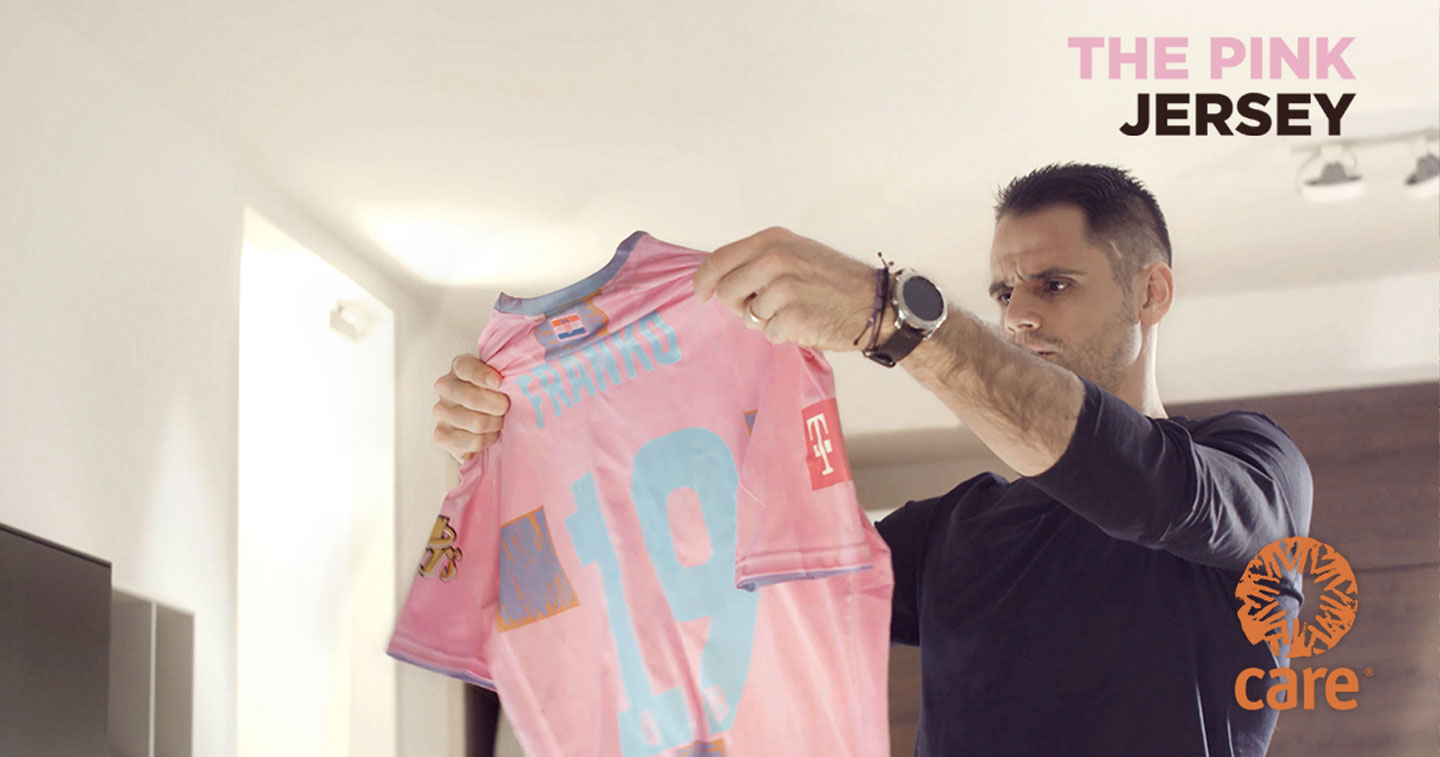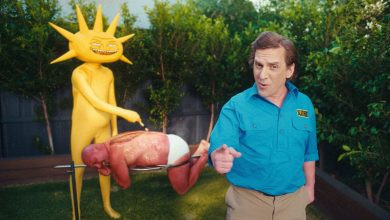PARIS – According to a UN study published on Friday 6 March: 9 out of 10 people in the world have a gender bias. This year, on international women’s day, football joined NGO CARE to fight against gender stereotypes.
On Sunday, March 8, during a long-awaited football match in Croatia between rivals Rijeka and Hajduk Split, while all the players of the Rijeka team were wearing the official regulation white jersey, Franko Andrijašević the star player from Rijeka took everyone by surprise when he entered the field with his pink dyed jersey.
The operation called #PinkJersey, initiated by the CARE association, staged a laundry mistake made by a star player of the Rijeka club. This is a way of making the male population in the Balkans aware that a more equal distribution of household chores is a first step towards greater equality between men and women.
In the Balkans, only 11% of men are involved in household chores. “Achieving gender equality takes practice. Let’s continue.” This is the message of footballer Franko Andrijašević and the CARE association. In a video unveiled at half-time by the player, the club and the association, we discover Franko, at home, taking his clothes out of his washing machine… Surprise, his white jersey has turned pink… He rummages through the bottom of the machine and takes out a red sock. If Franko and his wife now share the household chores, he still has some progress to make…
This rookie mistake is proof that we can all do something about gender inequality. Because equality starts as close as possible to each of us, especially in the family sphere where clichés have a hard time. All over the world, domestic chores are still the work of women.
“Football is known as a very macho sector. And in the Balkans, our societies are also sclerotic due to the legacy of years of war and a lot of clichés: women have to take care of the house first and foremost and men have to behave in a virile and violent way. I hope that this action, which will be seen by millions of people in front of their TV sets, will launch debates within families and encourage people to free themselves from the stereotypes that lock us up,” explains Franko Andrijašević.
An awareness-raising action, designed by the CLM BBDO agency, has a two-fold objective: to defend equality and combat stereotypes by going out onto the football pitch in the Balkan countries, a sport that is extremely popular with men in this part of the world. This is also CARE’s mission on the ground: the association carries out projects that promote equality and positive masculinity throughout the world. In the Balkans, for example, more than 100,000 boys and girls between the ages of 13 and 19 have already participated in CARE’s ‘Be a Man’ clubs, which are now integrated into school curricula. The motto: “Becoming a man is all about strengthening your neurons more than your biceps. Let’s put an end to stereotypes.”
“Nine out of ten people in the world have gender bias, according to the latest UN study released Mqrch 6. This is a stark reminder of what we see on the ground every day. This is what we are helping to change through our programmes to defend women’s rights, thanks in particular to the involvement of men,” explains Philippe Lévêque, director of the CARE France association. “Men are key players in putting an end to gender stereotypes. Like Franko Andrijašević, many are already committed, but all must now join the fight led by millions of girls and women for the respect of their rights around the world. The example of laundry may seem insignificant but has extremely negative impacts – often unsuspected – on women’s social and economic rights. And we will not achieve equality without a profound change in the behaviour of all of us. Structural changes are needed at all levels of society: from the home to national laws,” explains Philippe Lévêque, director of the CARE France association.
About CARE and the Young Men Initiative :
CARE: Founded in 1945, CARE is a leading humanitarian organization present in 100 countries around the world. CARE fights global poverty with a focus on women and girls because, given the right resources, they have the power to help lift families and entire communities out of poverty.
The Young Men Initiative (YMI) project began in 2006 and is being implemented in Bosnia and Herzegovina, Serbia, Croatia, Kosovo* and Albania. It is a long-term project targeting young people (young men in particular) to strengthen their knowledge and attitudes regarding gender equality and healthy lifestyles and to decrease levels of all types of violence.
YMI started in 2006 in Croatia, Serbia and Bosnia and Herzegovina with a small qualitative study on the attitudes and behaviours of young men, and over the years it has developed into a comprehensive programme with different components targeting young people, parents, teachers, education workers, university students, journalists and other key stakeholders. Since its inception, the programme has directly reached more than 100,000 high school students in 130 schools and 600,000 direct beneficiaries in the Balkans.
CREDITS
CARE
Emanuela CROCE
Director of Communications & Donation Collection
Laury-Anne BELLESSA
Head of the communication and media division
Camille NOZIERES
Press Relations Officer
CLM BBDO
Valérie ACCARY
President
Stéphane SANTANA & Benjamin DESSAGNE
Creative Directors
Tom DESMETTRE
Artistic Director
Vincent VIGNERON
Copywriter
Linnéa Kavsjö
Designer Writer
Clement Payen
Art Director
Pierre BOUDIN
Manufacturer
Antoine VICTOR
Client Director
Margaux GRENOUILLOUX
Strategic Planner
Marion WEILL-COLLANGE
Communication & Influence Manager
Fanny SACHOT
Communication & Influence Consultant
About the Author

Theda Braddock is an American who lives and works in Paris. She helps agencies develop their communication and promote creativity, and writes for several publications when she has time.















